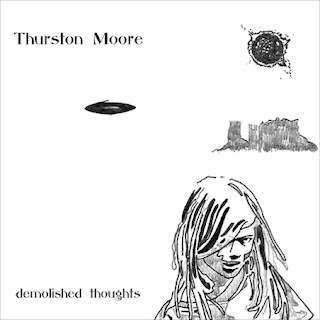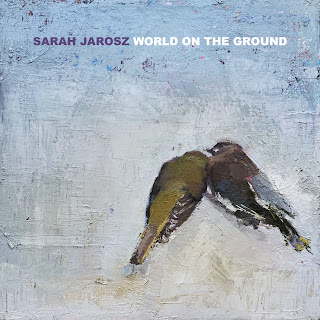
Yeah, no shit. Wanna know why? I write mostly about music I like. I don't offer a totally unique perspective and I don't claim to, but I try to offer a perspective that is, above all else,
mine, even if I'm not telling you anything you don't already know or that isn't widely available about the music I'm telling you about. My problem is that these days I might as well be writing about Halley's Comet or Dean Cain. Mark Twain, nominally a better a writer than me, said that writing is "5% inspiration, 95% perspiration". Where the fuck is my inspiration? Last year I compiled a list of my
Top 50 Albums of the Decade. The top 10 is as follows:
1. Augie March - Sunset Studies (2000)
2. Augie March - Strange Bird (2002)
3. Modest Mouse - The Moon & Antarctica (2000)
4. The Arcade Fire - Funeral (2004)
5. Radiohead - Kid A (2000)
6. Smog - A River Ain't Too Much to Love (2005)
7. Wolf Parade - Apologies to the Queen Mary (2005)
8. Mercury Rev - All is Dream (2001)
9. Queens of the Stone Age - Rated R (2000)
10. Tom Waits - Alice (2002)
Some time after I finished that list, I attempted to compile my Top 50 Albums of the 90s, but I quit because it was impossible. However, if you look at my
50 Favourite Albums (the accuracy of which I do not endorse), you can extrapolate that my 10 favourite albums of the 90s, according to the list, are as follows:
1. Radiohead - OK Computer (1997)
2. Mansun - Six (1998)
3. Mercury Rev - Deserter's Songs (1998)
4. Mansun - Attack of the Grey Lantern (1996)
5. Pavement - Brighten the Corners (1997)
6. Blur - 13 (1999)
7. Blur - Parklife (1994)
8. Sparklehorse - Good Morning Spider (1999)
9. Depeche Mode - Violator (1990)
10. Pavement - Wowee Zowee (1995)
That's as accurate as such a list could hope to be. The 00s list would lose a confrontation with the 90s list, but it would go toe to toe with it for several rounds and be able to hold its head up in dignified defeat. The pattern probably holds for the next ten albums or so, but from what I recall of the data I compiled for the aborted 90s list, the back 30 for the 00s can't offer it much of a fight. Number 50 for the 00s is
The Runners Four (2004)
by Deerhoof. I never decided on a number 50 for the 90s list, but the most likely candidate was
Pinkerton (1996) by Weezer.
The Runners Four is a very good album and could make an annual top 5 in a good year. Such an album in that position proves that the last decade
did have some depth. But compared to
Pinkerton? Yikes! Never mind going toe to toe;
The Runners Four would be lucky to last three rounds against a single snare beat from "Tired of Sex".
Bear in mind that the last two decades were equally formative for me as a music listener. Half of each were essential. The bias towards the latter half of the 90s in the list above reflects the fact that I started listening to music seriously in early 1995. My musical taste is always evolving, and while I'm always looking out for new artists (be they newcomers or just new to me), I don't discover them as quickly as many other people do. When I get into an artist, I thoroughly plunder their back catalogue at the expense of more rapidly discovering other artists. That's why it took a decade for me to come to a forced slowdown. This explains the bias in the 00s list towards the first half. I'd discovered many of what I consider the decade's best artists by the end of 2004, and with the discovery of new music becoming more of a conscious effort, enjoying the music was sometimes an effort, too.
However, I blame the music more than I blame me, and it's hard not to think that the 10s might by a long shot fail to stack up to the 00s. I turned [redacted] late last decade, so maybe this outlook is inevitable. I don't
think I'm losing my objectivity, but then my grandmother doesn't think she's losing her short term memory and cognitive faculties. Weezer's output throughout its decade-and-a-half-and-still-going career produces downward a curve that, thankfully, exaggerates the sort I might draw to represent the decline of music in general on my worst day. I'm old enough to remember when the name carried entirely different connotations. The first Weezer album from 1994 still stands out as witty yet poignant pop-rock crafted with unassuming skill.
Pinkerton is a raw, cathartic blast of youthful angst, again tempered (but this time barely) by that wit. Weezer's transition into the 00s, though, is the ugliest I can think of. After a five year break and the loss of Matt Sharp, they tried in vain to remake their debut. Now they're even worse; it's painful to hear Rivers Cuomo try to channel his glib, nerdy, 20-something self as a 40-something adolescent. It's almost as pathetic as that blogger whose longest post in some time is the one in which he whines about the very thing he claims to love.
 Wild Flag is Carrie Brownstein and Janet Weiss (Sleater-Kinney), Mary Timony (Helium) and Rebecca Cole (The Minders), but then you either knew that by now or you don't care. Or maybe you knew and you didn't care. If that's the case, you'll have no interest in the link to their new single below.
Wild Flag is Carrie Brownstein and Janet Weiss (Sleater-Kinney), Mary Timony (Helium) and Rebecca Cole (The Minders), but then you either knew that by now or you don't care. Or maybe you knew and you didn't care. If that's the case, you'll have no interest in the link to their new single below.





